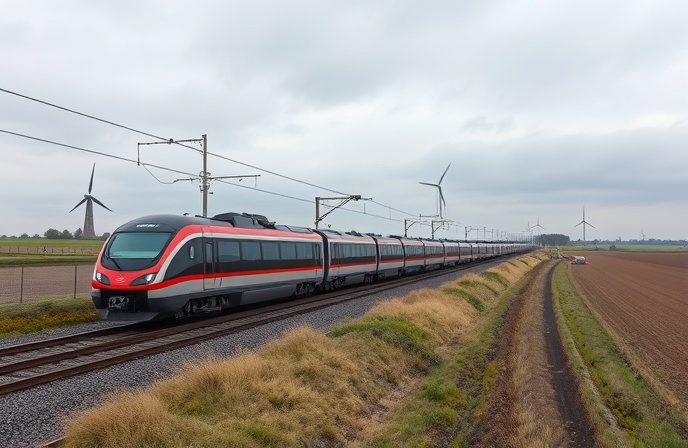Poland’s E-20 Railway Upgrade: A Success Story

This article examines the successful modernization of the Żychlin-Barłogi section of the E-20 railway line in Poland, highlighting the collaborative efforts of the involved consortium, the project’s logistical complexities, and the significant improvements to railway infrastructure and travel times resulting from this undertaking. The modernization, completed ahead of schedule, showcases efficient project management and collaboration within the Polish railway industry. The project serves as a case study demonstrating the challenges and rewards of large-scale railway infrastructure upgrades and the positive impact such projects have on national transport networks. The analysis delves into the technical aspects of the work, the collaborative approach of the consortium, and the broader context of ongoing railway modernization efforts in Poland. Furthermore, the article explores the implications of this project for future railway development in the country, considering its potential to inform best practices and enhance efficiency in subsequent modernization initiatives. It will specifically examine the strategies used to manage the complex logistical challenges posed by a complete line closure, the use of innovative construction techniques, and the overall success in delivering the project ahead of schedule.
Consortium Collaboration and Project Management
The modernization of the 18km Żychlin-Barłogi section (LCS Kutno) of the E-20 line was undertaken by a consortium comprising ZUE, Budimex, and Strabag. This collaborative approach proved crucial to the project’s success, enabling efficient resource allocation and expertise sharing. The seamless cooperation, as highlighted by ZUE’s communications director, Grzegorz Krzystański, demonstrates the benefits of a well-coordinated consortium structure in handling complex infrastructure projects. The ability to leverage the specialized skills and resources of each member contributed significantly to the project’s completion eight days ahead of schedule. The 24/7 work schedule implemented by Budimex, specifically at the Zamków rail yard, Barłogi station, and the Barłogi route at the LCS Kutno border, further showcases the commitment to timely project delivery. This demonstrates a proactive and efficient approach to project management crucial for minimizing disruption and adhering to stringent deadlines.
Logistical Challenges and Mitigation Strategies
The modernization necessitated a complete line closure, presenting significant logistical challenges. Passenger and freight traffic were rerouted via alternative routes, supplemented by bus services. The successful management of this rerouting highlights the importance of detailed pre-planning and coordination with transport operators. The consortium’s strategy to minimize the duration of these alternate routes, through the 24/7 work schedule, demonstrates an understanding of the broader implications of the closure and a commitment to minimizing disruption to the public. The intricate coordination involved in managing the temporary transport solutions exemplifies the multifaceted nature of large-scale railway modernization projects. The seamless transition back to the modernized railway line after completion further underscores the success of the logistical planning and execution.
Technical Aspects of the Modernization
The project involved a complete disassembly of the existing track, followed by ground reinforcement and the construction of a new 18km track bed. This signifies a substantial upgrade to the railway’s infrastructure, improving its longevity, safety, and operational efficiency. The focus on ground reinforcement highlights a commitment to long-term infrastructure resilience and sustainability. The scale of the track replacement underscores the extent of the modernization and the significant investment made in upgrading Poland’s railway network. This commitment to robust infrastructure is essential for ensuring the long-term viability and performance of the railway line, supporting increased traffic volume and enhancing operational reliability.
Wider Implications and Future Railway Development
The successful completion of the Żychlin-Barłogi modernization project provides valuable insights into efficient project management techniques and successful consortium collaboration within the Polish railway sector. Budimex’s involvement in several other ongoing modernization projects, including the reconstruction of Olszamowice station, the modernization of the Warsaw railway line, and work on railway line number 7 (Otwock-Dęblin) and the E59 line (Rokietnica-Wronki), as well as LCS Idzikowice, demonstrates a commitment to large-scale improvements in Poland’s railway infrastructure. The anticipated reduction in travel times between Poznań and Warsaw (by 2 hours and 20 minutes) underscores the positive impact of such modernization initiatives on national transport efficiency and passenger convenience. The project’s success provides a strong foundation for future upgrades, setting a benchmark for collaborative partnerships and efficient execution in tackling similar projects across the Polish railway network.
Conclusions
The modernization of the Żychlin-Barłogi section of the E-20 railway line in Poland, successfully completed by the consortium of ZUE, Budimex, and Strabag, serves as a compelling case study in efficient railway infrastructure upgrades. The project’s success stems from a combination of factors, including effective consortium collaboration, meticulous planning to mitigate the impact of a complete line closure, and the implementation of robust construction techniques, resulting in a significant improvement in the railway’s infrastructure. The eight-day early completion highlights the commitment to efficient project management and the successful integration of diverse expertise within the consortium. The substantial improvements to the track, including ground reinforcement and the construction of an entirely new 18km track bed, will enhance the line’s capacity, safety, and operational efficiency for years to come. The project’s completion also underlines the broader commitment to modernizing Poland’s railway network, improving travel times and overall transportation efficiency. The experience gained from this project, particularly in managing logistical challenges and coordinating consortium efforts, will undoubtedly inform and improve future railway modernization efforts in Poland. The successful completion of this project provides a valuable model for efficient railway upgrades, demonstrating the significant benefits of effective collaboration, innovative construction techniques, and a commitment to delivering projects ahead of schedule and within budget. This sets a positive precedent for future infrastructure projects aimed at enhancing Poland’s national rail network.



